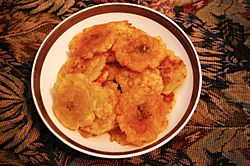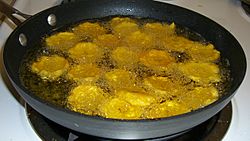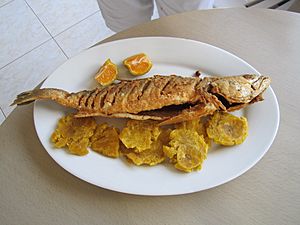Tostones facts for kids
 
Tostones being cooked
|
|||||||
| Alternative names | Patacones | ||||||
|---|---|---|---|---|---|---|---|
| Type | Side Dish | ||||||
| Region or state | Puerto Rico and Latin America | ||||||
| Main ingredients | Unripe plantains, oil | ||||||
| Ingredients generally used | Salt, other seasonings | ||||||
| 92 kcal (385 kJ) | |||||||
|
|||||||
Tostones are yummy slices of plantain that are fried not once, but twice! The name tostones comes from the Spanish word tostar, which means "to toast." You can find these tasty treats all over Latin America and the Caribbean.
While they are often called tostones in places like Puerto Rico, Jamaica, Nicaragua, Cuba, Honduras, and Venezuela, they have other names too. In Panama, Venezuela, Colombia, Costa Rica, Peru, and Ecuador, they are known as patacones. In the Dominican Republic, people might call them platano frito or frito verde. And in Haiti, they are called bananes pesées.
Contents
How to Make Tostones
Making tostones starts with green, unripe plantains. First, you peel the plantains. Then, you cut them into slices. You can slice them long, diagonally, or in round pieces.
Next, these raw plantain slices are fried for a short time, usually one to two minutes on each side. They should turn a nice golden color. After this first fry, you take them out and gently pat them to remove any extra cooking oil.
Now comes the fun part! You need to flatten the plantain slices. People often use a special tool called a tostonera for this. It's a hinged tool made just for flattening plantains. If you don't have one, you can use anything with a flat surface, like two plates.
Once the plantains are flat, they go back into the hot oil for a second fry. This time, you fry them until they are super crisp and golden brown. That's how they get their amazing crunch!
Where Did Tostones Come From?
It's a bit of a mystery where the recipe for tostones first began. Many countries in the Caribbean and Latin America believe they are the originators of this delicious dish.
The dish goes by different names depending on the country. They are called patacones in countries like Panama, Colombia, Ecuador, Costa Rica, and Peru. On the other hand, they are known as tostones in Cuba, Nicaragua, Puerto Rico, and the Dominican Republic. In the Dominican Republic, they also have names like platano frito or fritos verdes. In Haiti, they are sometimes called bannan fris.
How to Enjoy Tostones

Tostones are often salted and eaten like potato chips or French fries. They are a popular side dish or snack.
In some places, people like to dip them in a special garlic sauce called mojo or a spicy sauce called ají. In Colombia, you might find them served with a sauce called hogao or topped with seasoned shredded beef.
In Costa Rica, tostones are often eaten with a thick dip made from black beans. In the Dominican Republic, it's common to squeeze fresh lime juice over them and sprinkle them with salt. If you're in Guatemala on the Caribbean coast, tostones are usually served as a side dish with fish or chicken.
Sometimes, tostones are served as an appetizer topped with cheese. You might also find them with shrimp ceviche, pulled chicken, or avocado salad. You can even buy them already prepared in supermarkets!
Tostones are a very important part of many Caribbean and Latin American meals. In Nicaragua, they are often served with fried cheese and sometimes with refried beans. In places like Cuba, Puerto Rico, the Dominican Republic, Panama, the north coast of Honduras, and Haiti, they are a staple food. In Haiti, they are often served with traditional griot (fried pork) or picklise (pikliz), which is a pickled hot pepper mix.
You can also find similar plantain crisps in West African cuisine.
Other Meanings of "Tostón"
In Honduras, the word tostón can also mean the 50-cent coin of their local money, called the lempira. This is also true in Mexico for 50 cents of a peso.
In the Dominican Republic, the word tostones can sometimes refer to plantain chunks that have only been fried once, not twice.
Images for kids
See also
 In Spanish: Patacón (gastronomía) para niños
In Spanish: Patacón (gastronomía) para niños
 | John T. Biggers |
 | Thomas Blackshear |
 | Mark Bradford |
 | Beverly Buchanan |




